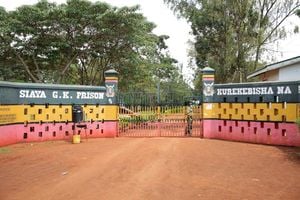
GRAPHIC | GENNEVIEVE AWINO | NMG
|Business
Premium
Sh200 billion assets-rich parastatals put on sale
President William Ruto’s administration is proposing to sell 11 parastatals with an asset value of more than Sh200 billion as part of the International Monetary Fund-backed reforms aimed at restructuring public entities and lessening reliance on taxpayers.
Treasury Cabinet Secretary Njuguna Ndung’u has in a new privatisation programme under the newly-enforced law disclosed plans to offload government shares in 11 State-owned enterprises.
The proposal has lined up five profitable entities and six cash-strapped firms for sale to either strategic investors or through an initial public offering (IPO) subject to public views, Cabinet approval, and ratification by lawmakers.
Treasury officials in July committed to IMF chiefs that they will have an updated list of entities to be privatised approved by the 26-member Cabinet by the end of the year.
This is part of far-reaching reforms aimed at restructuring struggling parastatals and mitigating the risks they present to the taxpayer, including Sh170.23 billion guaranteed loans, Sh111.80 billion non-guaranteed loans, and Sh983.20 billion on-lent loans by June 2023.
Stable government-owned firms which are in line to be sold are Kenya Pipeline Company (KPC), Kenyatta International Convention Centre (KICC), Kenya Literature Bureau (KLB), New Kenya Cooperative Creameries (New KCC) Ltd, and Kenya Seed Company, which is 53 percent State-owned.
Financially-troubled entities on the sale list are National Oil Corporation of Kenya (Nock), Rivatex East Africa Ltd, Numerical Machining Complex (NMC) Ltd, Kenya Vehicle Manufacturers (KVM) Ltd, where the government owns a 35 percent stake, Mwea Rice Mills, and Western Kenya Rice Mills.
President Ruto is keen on selling shares in some of the more than 100 parastatals as a way of raising fresh cash for a government battling a short-term cash crunch as well as ending nearly a decade of primary listing drought on the Nairobi Securities Exchange (NSE).
During his first official visit to the NSE on October 11, 2022 – barely a month after taking power— Dr Ruto pledged to offload shares in as many as 10 State-owned firms through the stock market, a process technically called initial public offering (IPO), in his first year in office.
“There is a lot that can be done in that space and I am not seeing movement in that space, especially on the issues that we discussed when I came to the NSE,” Dr Ruto said in September.
“I know I have a part to keep, and that is to deliver some government companies for sale. I am working on it,” he said.
Last week on Thursday, the President told an annual meeting of the African Stock Exchanges Association in Nairobi that Kenya has identified 35 State-owned firms for privatisation.
“One of (the reasons for privatisation) is to inspire market activity,” Dr Ruto told the gathering, insisting that raising revenue from the sale was “a secondary issue”.
Privatisation of parastatals suffered a hiatus between 2014 and 2022 due to a raft of challenges including a lack of quorum on the board and legal suits.
The sole successful deal under the previous privatisation programme under the repealed law was the sale of a 26 percent stake in Kenya Wine Agencies Ltd (Kwal) to South Africa’s Distell in 2014.
The last successful privatisation by the government through an IPO was the hugely oversubscribed sale of 25 percent shareholding in Safaricom in 2008 by the Mwai Kibaki administration.
Other large State-controlled firms whose shares were listed during the Kibaki era between 2003 and 2008 included KenGen, Kenya Reinsurance and Mumias Sugar.
The listing of any of the proposed five profitable parastatals, if okayed by the public, the Cabinet and lawmakers, will end an eight-year IPO drought at the NSE since October 2015 when the Stanlib Fahari REIT was listed.
KPC, a monopoly in oil pipeline transportation, accounts for nearly three-quarters of the asset value of all entities proposed for privatisation and it appears to be the most stable.
“This [privatisation] will be determined by the financial health of the institution. If it has been making losses, you cannot take it to the securities exchange,” Joseph Koskey, the chief executive of Privatisation Authority, told the Business Daily.
“There are conditions that you must meet for you to float the shares of a company [on the NSE].”
That means Nock, Rivatex, NMC, KVM, Mwea Rice Mills and Western Kenya Rice Mills will likely be sold to strategic investors, with the latter two to be bought by cooperative societies.
“If it [a parastatal] has been making losses, and you think that what this company is lacking is equipment because they may be still using outdated machines and equipment because they may have not been getting required allocation from the Treasury, then that requires getting a strategic investor,” Mr Koskey said.
The Privatisation Act, of 2023, which repealed the previous law of 2005 in October, requires the Treasury CS to specify the criteria used to identify the firms to be privatised.
The legal considerations include strategic priorities and goals the process will achieve, the strategic role of the firms to be sold to private investors and government policy.
Prof Ndung’u, the Treasury CS, says transferring the operations of KPC to a private entity will open the door for strong oversight of its operations, improve efficiency and open up the sector for competition.





